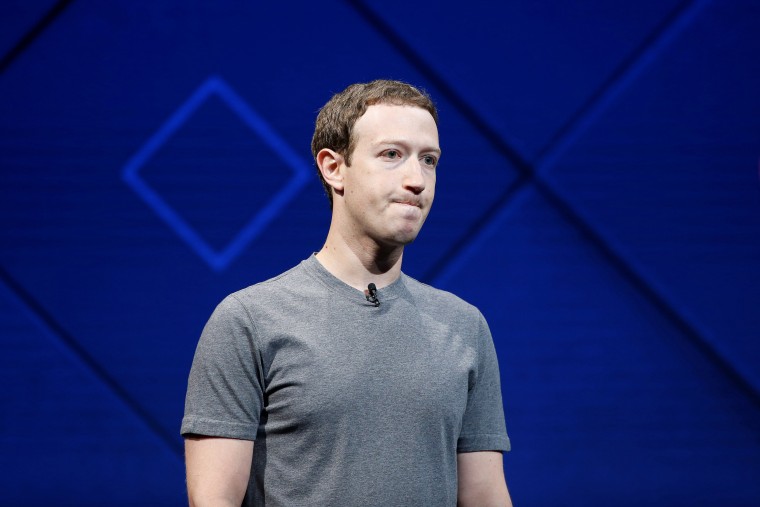The leaders of four civil rights groups called for advertisers to continue boycotting Facebook after a meeting Tuesday with the company's top executives that they said left them feeling unconvinced of the social media giant's commitment to stopping hate speech.
The virtual summit, which involved Facebook CEO Mark Zuckerberg, Chief Operating Officer Sheryl Sandberg and more than half a dozen other top executives, came weeks after the civil rights groups launched the "Stop Hate For Profit" initiative that has spurred more than 900 companies, including Unilever, Coca-Cola, Microsoft and Starbucks, to halt advertising with Facebook.
“We’ve seen over and over again how it will do anything to duck accountability by firing up its powerful PR machine and trying to spin the news,” said Jessica J. González, co-CEO of Free Press, a nonprofit organization that lobbies technology and media companies on behalf of people of color and underserved communities.
Jonathan Greenblatt, the chief executive of the Anti-Defamation League, said the boycott “will continue to grow and it will get more global, and it will get more intense until we get the answers I think we are looking for.”
Derrick Johnson, the president and chief executive of the NAACP, told NBC News in an interview, that Facebook only acted to take down white supremacist groups after they were alerted rather than doing it proactively. “They have the technology to prevent racial hate speech.” On the ad boycott he added: “Companies stood up because they see what many of us see: the proliferation of racial hate groups needs to be addressed.”
The boycott has been a public relations headache for Facebook even if it has done relatively little damage to the company's business, which includes more than $70 billion in annual ad revenue. Facebook executives have also said they are committed to working with civil rights groups to fight hate speech, but will not make decisions based on outside pressure.
The executives sought to reiterate that to the organizers Tuesday. Toward the end of the call, one of the civil rights leaders told them to "listen to your advertisers," according to two people with knowledge of the call, who requested anonymity because they were not authorized to discuss it publicly.
Sandberg responded that advertiser pressure did not affect the company's decisions.
“We want to listen to the civil rights community," she said. "We are not outsourcing civil rights to our advertisers. We are not going to make this decision based on advertisers."
In a statement after the meeting, Facebook policy spokesperson Andy Stone said the company was committed to fighting hate speech. “They want Facebook to be free of hate speech and so do we,” he said.
As the organizers see it, however, Facebook is simply refusing to take the steps necessary to make real progress against hate speech.
Derrick Johnson, the president and chief executive of the NAACP, said in an interview that Facebook only acted to take down white supremacist groups after they were alerted rather than doing it proactively.
“They have the technology to prevent racial hate speech,” he said.
The organizers also said that Facebook executives were open to hiring someone in “a civil rights position but were unable to commit to the crucial piece of the position being at the C-suite level or what the requirements for the position will be.”
“However, they offered no attempt to respond to the other nine recommendations. Zuckerberg offered no automatic recourse for advertisers whose content runs alongside hateful posts," they said.
González, Greenblatt, Johnson and Color Of Change President Rashad Robinson all attended the virtual meeting, according to Free Press.
Facebook executives entered Tuesday’s meeting hoping to address the organizers’ concerns but had no plans to announce any major policy changes, several people familiar with their thinking told NBC News ahead of the meeting.
In a Facebook post put up before the meeting, Sandberg said whatever changes the company made would be done in response to its own civil rights audit, and "not for financial reasons or advertiser pressure, but because it is the right thing to do."
The executives also expected the organizers to leave the meeting unsatisfied, given that Facebook would not meet their demands, which included having it refund companies when their ads appeared next to hate speech, and forcing it to hire a C-suite executive to oversee concerns about discrimination, bias and hate, according to the sources.
In addition to Zuckerberg and Sandberg, representatives from the Facebook side included Chris Cox, chief product officer, Nick Clegg, vice president of global affairs, Neil Potts, public policy director, Carolyn Everson, vice president of global marketing solutions, and Ime Archibong, head of new product experimentation.
“This isn’t over,” Free Press said in its statement. “We will continue to expand the boycott until Facebook takes our demands seriously. We won’t be distracted by Facebook’s spin today or any day. Mark, Sheryl and their colleagues have much work to do to make Facebook a better place for everyone, and they need to get it done now.”
Stacey Grier, chief marketing officer of The Clorox Company, urged Facebook to do more. "We would ask Facebook to accelerate the timeline to make a significant and sustained decrease in hate speech and false information," she said in a statement. "We would like to see advertisers have more transparency and control."
The Facebook executives also held a second meeting Tuesday with other civil rights representatives who have been working closely with the company on civil rights issues, including Laura Murphy, its civil rights auditor, Vanita Gupta of the Leadership Conference on Civil and Human Rights, and Sherrilyn Ifill of the NAACP Legal Defense and Educational Fund. Two people at Facebook with knowledge of the meeting who requested anonymity because they were not authorized to speak publicly described the second meeting as more productive than the first.

